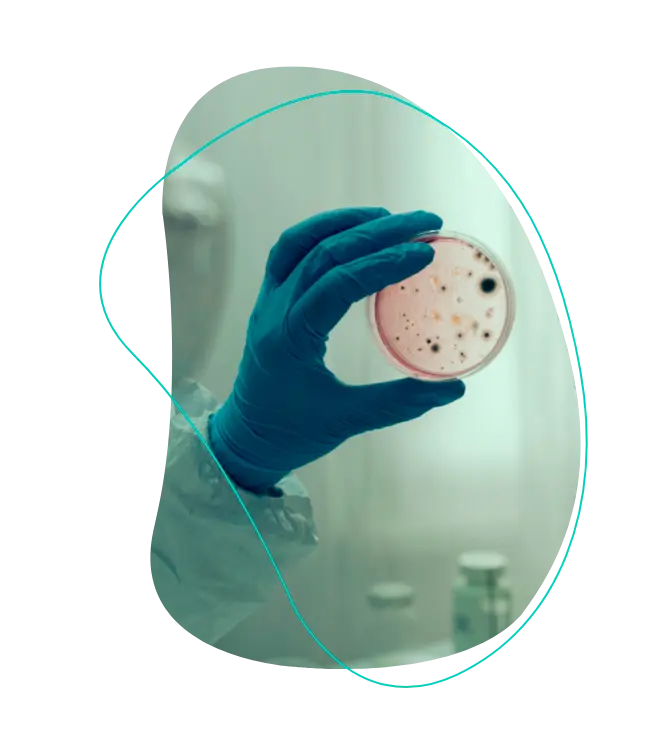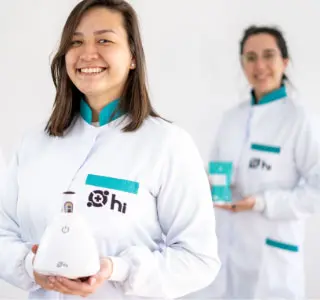Exame de Procalcitonina (PCT): o marcador de infecções bacterianas
Entenda como funciona o exame de Procalcitonina Point-of-Care, indicado para auxiliar no diagnóstico de infecções bacterianas, sepse e para acompanhar o tratamento com antibióticos.
Voltar
Entenda como funciona o exame de Procalcitonina Point-of-Care, indicado para auxiliar no diagnóstico de infecções bacterianas, sepse e para acompanhar o tratamento com antibióticos.
Sepse é uma disfunção desencadeada por resposta inflamatória do organismo a uma bactéria. Por se manifestar como diferentes estágios clínicos de um mesmo processo fisiopatológico, o diagnóstico precoce é um desafio para médicos.
Devido ao aumento de sua incidência em todo o mundo, a sepse vem adquirindo crescente importância entre os profissionais da saúde. O crescimento da resistência bacteriana, a melhoria no atendimento de emergência, o aumento da população idosa e do número de pacientes imunossuprimidos contribuem para esse aumento.

O Exame de Procalcitonina Hilab é um imunoensaio cromatográfico rápido para detecção qualitativa de procalcitonina em amostras de sangue , obtidas por punção digital, um método rápido e indolor.
O resultado da reação da amostra é digitalizado e verificado por nossa inteligência artificial, antes de ser analisado por um profissional de saúde. O resultado é enviado por e-mail e SMS.*
*Verificar disponibilidade em farmácias e consultórios isolados
O exame é recomendado principalmente para descartar septicemia/sepse, em conjunto com outros exames, devido ao elevado valor preditivo negativo (99%).
O valor preditivo negativo significa a proporção de verdadeiros negativos entre todos os indivíduos com teste negativo. Sendo assim, um resultado não reagente dificilmente será reagente (1%).
O exame também pode auxiliar na decisão médica para iniciar ou diminuir o período de tratamento com antibióticos e a orientar no período de hospitalização do paciente.

Analitos detectados: Procalcitonina (PCT)
Método: Imunocromatografia.
Tipo de Amostra: Sangue total.
Tempo total até a liberação do laudo: 25 minutos.
Especificidade: >98,9%
Sensibilidade: >98,7%
Reg. Anvisa: 80583710034
O resultado indica concentrações abaixo de 1 ng/mL de procalcitonina na amostra analisada. O resultado não deve ser utilizado como critério único para descartar a possibilidade de infecções bacterianas ou sepse. É necessário avaliar as manifestações clínicas e exames complementares.
O resultado indica concentrações acima de 1 ng/mL de procalcitonina na amostra analisada. O resultado não deve ser utilizado como critério único para o diagnóstico de infecções bacterianas ou sepse. É necessário avaliar as manifestações clínicas e exames complementares.
Atenção: este exame não substitui um diagnóstico médico e o laudo deve ser levado para avaliação.
Se interessou em oferecer o exame de Procalcitonina ou quer encontrar o local mais próximo para fazer o exame? Vai de Hilab!

A procalcitonina (PCT) é um biomarcador inflamatório. Produzida pelas células C tireoidianas e em células endócrinas pulmonares, a PCT é precursora do hormônio calcitonina e possui um papel metabólico na homeostase do cálcio.
É liberada na circulação sanguínea em resposta aos estímulos pró-inflamatórios, especialmente em infecções bacterianas, alcançando níveis elevados 6 horas após a invasão bacteriana. A PCT atua como um biomarcador indireto de infecções e sua meia-vida é de aproximadamente 24 horas.
A procalcitonina (PCT) é um biomarcador inflamatório. Produzida pelas células C tireoidianas e em células endócrinas pulmonares, a PCT é precursora do hormônio calcitonina e possui um papel metabólico na homeostase do cálcio.
É liberada na circulação sanguínea em resposta aos estímulos pró-inflamatórios, especialmente em infecções bacterianas, alcançando níveis elevados 6 horas após a invasão bacteriana. A PCT atua como um biomarcador indireto de infecções e sua meia-vida é de aproximadamente 24 horas.
O uso desnecessário de antibióticos contribui significativamente para aumentar a resistência bacteriana e os custos médicos, bem como o risco de eventos adversos relacionados ao uso desses fármacos.
A PCT aumenta em infecções bacterianas e diminui quando os pacientes se recuperam da infecção. Portanto, o marcador pode ser utilizado para apoiar a tomada de decisão clínica para o início e a descontinuação da antibioticoterapia em pacientes com suspeita clínica de infecção.
Segundo Schuetz e colaboradores (2009), ensaios clínicos randomizados demonstraram que essa estratégia funciona, principalmente em pacientes com infecções respiratórias. No entanto, a maioria desses estudos individuais não incluiu pacientes suficientes para permitir uma avaliação conclusiva sobre sua segurança2.
A PCT é um biomarcador inflamatório, usado para o diagnóstico diferencial entre infecções virais, nas quais costuma apresentar níveis baixos no soro, e bacterianas, nas quais seus níveis em geral estão elevados3.
Pacientes com COVID-19 grave não apresentam elevação de PCT, exceto quando apresentam infecção bacteriana secundária. Desta forma, a procalcitonina mostrou-se útil para identificar pacientes com COVID-19 e superinfecção bacteriana, inclusive quando não foi possível isolar o agente infeccioso4.
1Instituto Latino-Americano para Estudos da Sepse Sepse: um problema de saúde pública / Instituto Latino-Americano para Estudos da Sepse. Brasília: CFM, 2015. 90 p.
2Schuetz, P., Muller, B., Christ-Crain, M., Stolz, D., Tamm, M., Bouadma, L., Luyt, C.E., Wolff, M., Chastre, J., Tubach, F., Kristoffersen, K.B., Burkhardt, O., Welte, T., Schroeder, S., Nobre, V., Wei, L., Bhatnagar, N., Bucher, H.C. and Briel, M. (2013), Procalcitonin to initiate or discontinue antibiotics in acute respiratory tract infections. Evid.-Based Child Health, 8: 1297-1371. https://doi.org/10.1002/ebch.1927.
3Hamade B, Huang DT. Procalcitonin: where are we now? Crit Care Clin 2020;36(1):23-40. doi: 10.1016/j.ccc.2019.08.003. (Publicado online em 21 de outubro de 2019).
4Nishioka, Sérgio de Andrade. UNA-SUS. A procalcitonina pode ser útil para o diagnóstico de infecções bacterianas em pacientes com COVID-19 internados em unidades de terapia intensiva. Disponível em: . Acesso em: 03 de agosto de 2021.
| Cookie | Duração | Descrição |
|---|---|---|
| cookielawinfo-checkbox-advertisement | 1 year | Set by the GDPR Cookie Consent plugin, this cookie records the user consent for the cookies in the "Advertisement" category. |
| cookielawinfo-checkbox-analiticos | 1 year | Set by the GDPR Cookie Consent plugin to store the user consent for cookies in the category "Analytics". |
| cookielawinfo-checkbox-analytics | 1 year | Set by the GDPR Cookie Consent plugin, this cookie records the user consent for the cookies in the "Analytics" category. |
| cookielawinfo-checkbox-desempenho | 1 year | CookieYes set this cookie to store the user consent for the cookies in the category "Analytics". |
| cookielawinfo-checkbox-funcional | 1 year | CookieYes set this cookie to record the user consent for the cookies in the category "Functional". |
| cookielawinfo-checkbox-functional | 1 year | The GDPR Cookie Consent plugin sets the cookie to record the user consent for the cookies in the category "Functional". |
| cookielawinfo-checkbox-necessarios | 1 year | CookieYes sets this cookie to store the user consent for the cookies in the category "Necessary". |
| cookielawinfo-checkbox-necessary | 1 year | Set by the GDPR Cookie Consent plugin, this cookie records the user consent for the cookies in the "Necessary" category. |
| cookielawinfo-checkbox-others | 1 year | Set by the GDPR Cookie Consent plugin, this cookie stores user consent for cookies in the category "Others". |
| cookielawinfo-checkbox-performance | 1 year | Set by the GDPR Cookie Consent plugin, this cookie stores the user consent for cookies in the category "Performance". |
| cookielawinfo-checkbox-publicidade | 1 year | Set by the GDPR Cookie Consent plugin to store the user consent for cookies in the category "Advertising". |
| CookieLawInfoConsent | 1 year | CookieYes sets this cookie to record the default button state of the corresponding category and the status of CCPA. It works only in coordination with the primary cookie. |
| wpEmojiSettingsSupports | session | WordPress sets this cookie when a user interacts with emojis on a WordPress site. It helps determine if the user's browser can display emojis properly. |
| Cookie | Duração | Descrição |
|---|---|---|
| __rd_experiment_version | session | No description available. |
| __trf.src | 1 year | No description available. |
| cookielawinfo-checkbox-outros | 1 year | Description is currently not available. |
| vuex | never | No description available. |
| Cookie | Duração | Descrição |
|---|---|---|
| ANONCHK | 10 minutes | The ANONCHK cookie, set by Bing, is used to store a user's session ID and verify ads' clicks on the Bing search engine. The cookie helps in reporting and personalization as well. |
| bcookie | 1 year | LinkedIn sets this cookie from LinkedIn share buttons and ad tags to recognize browser IDs. |
| bscookie | 1 year | LinkedIn sets this cookie to store performed actions on the website. |
| fr | 3 months | Facebook sets this cookie to show relevant advertisements by tracking user behaviour across the web, on sites with Facebook pixel or Facebook social plugin. |
| IDE | 1 year 24 days | Google DoubleClick IDE cookies store information about how the user uses the website to present them with relevant ads according to the user profile. |
| li_sugr | 3 months | LinkedIn sets this cookie to collect user behaviour data to optimise the website and make advertisements on the website more relevant. |
| MUID | 1 year 24 days | Bing sets this cookie to recognise unique web browsers visiting Microsoft sites. This cookie is used for advertising, site analytics, and other operations. |
| test_cookie | 15 minutes | doubleclick.net sets this cookie to determine if the user's browser supports cookies. |
| VISITOR_INFO1_LIVE | 6 months | YouTube sets this cookie to measure bandwidth, determining whether the user gets the new or old player interface. |
| VISITOR_PRIVACY_METADATA | 6 months | YouTube sets this cookie to store the user's cookie consent state for the current domain. |
| YSC | session | Youtube sets this cookie to track the views of embedded videos on Youtube pages. |
| yt.innertube::nextId | never | YouTube sets this cookie to register a unique ID to store data on what videos from YouTube the user has seen. |
| yt.innertube::requests | never | YouTube sets this cookie to register a unique ID to store data on what videos from YouTube the user has seen. |
| Cookie | Duração | Descrição |
|---|---|---|
| _clck | 1 year | Microsoft Clarity sets this cookie to retain the browser's Clarity User ID and settings exclusive to that website. This guarantees that actions taken during subsequent visits to the same website will be linked to the same user ID. |
| _clsk | 1 day | Microsoft Clarity sets this cookie to store and consolidate a user's pageviews into a single session recording. |
| _fbp | 3 months | Facebook sets this cookie to display advertisements when either on Facebook or on a digital platform powered by Facebook advertising after visiting the website. |
| _ga | 1 year 1 month 4 days | Google Analytics sets this cookie to calculate visitor, session and campaign data and track site usage for the site's analytics report. The cookie stores information anonymously and assigns a randomly generated number to recognise unique visitors. |
| _ga_* | 1 year 1 month 4 days | Google Analytics sets this cookie to store and count page views. |
| _gcl_au | 3 months | Google Tag Manager sets the cookie to experiment advertisement efficiency of websites using their services. |
| _gd* | session | Google sets this cookie to allow the use of Google Analytics service for anonymous visitor tracking on the website. Google Analytics is used to compile reports and improve the site.nn |
| _rdtrk | 9 years 6 months 12 days 7 hours 10 minutes | Used by RD Station to keep a list of all pages a visitor accessed within the domain even before conversion. |
| AnalyticsSyncHistory | 1 month | Linkedin set this cookie to store information about the time a sync took place with the lms_analytics cookie. |
| CLID | 1 year | Microsoft Clarity set this cookie to store information about how visitors interact with the website. The cookie helps to provide an analysis report. The data collection includes the number of visitors, where they visit the website, and the pages visited. |
| MR | 7 days | This cookie, set by Bing, is used to collect user information for analytics purposes. |
| rdtrk | 1 year | RD Station sets this cookie to store the list of all pages a visitor accessed within the user domain, even before conversion. |
| SM | session | Microsoft Clarity cookie set this cookie for synchronizing the MUID across Microsoft domains. |
| Cookie | Duração | Descrição |
|---|---|---|
| lang | never | LinkedIn sets this cookie to remember a user's language setting. |
| li_gc | 6 months | Linkedin set this cookie for storing visitor's consent regarding using cookies for non-essential purposes. |
| lidc | 1 day | LinkedIn sets the lidc cookie to facilitate data center selection. |
| UserMatchHistory | 1 month | LinkedIn sets this cookie for LinkedIn Ads ID syncing. |
| yt-player-headers-readable | never | The yt-player-headers-readable cookie is used by YouTube to store user preferences related to video playback and interface, enhancing the user's viewing experience. |
| yt-remote-cast-available | session | The yt-remote-cast-available cookie is used to store the user's preferences regarding whether casting is available on their YouTube video player. |
| yt-remote-cast-installed | session | The yt-remote-cast-installed cookie is used to store the user's video player preferences using embedded YouTube video. |
| yt-remote-connected-devices | never | YouTube sets this cookie to store the user's video preferences using embedded YouTube videos. |
| yt-remote-device-id | never | YouTube sets this cookie to store the user's video preferences using embedded YouTube videos. |
| yt-remote-fast-check-period | session | The yt-remote-fast-check-period cookie is used by YouTube to store the user's video player preferences for embedded YouTube videos. |
| yt-remote-session-app | session | The yt-remote-session-app cookie is used by YouTube to store user preferences and information about the interface of the embedded YouTube video player. |
| yt-remote-session-name | session | The yt-remote-session-name cookie is used by YouTube to store the user's video player preferences using embedded YouTube video. |
| ytidb::LAST_RESULT_ENTRY_KEY | never | The cookie ytidb::LAST_RESULT_ENTRY_KEY is used by YouTube to store the last search result entry that was clicked by the user. This information is used to improve the user experience by providing more relevant search results in the future. |
| Cookie | Duração | Descrição |
|---|---|---|
| SRM_B | 1 year 24 days | Used by Microsoft Advertising as a unique ID for visitors. |